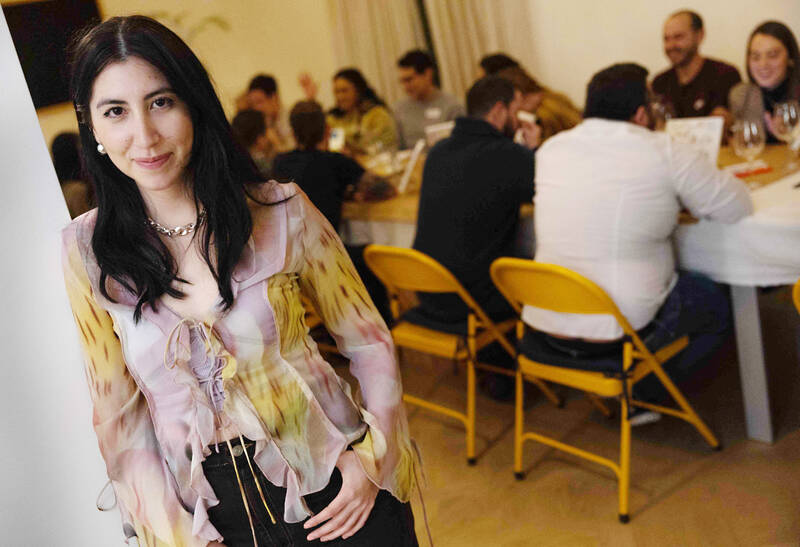Jilted on dating apps but undeterred in the quest for romance, 20 young singles gathered in Madrid to share activities and flirtatious smiles in a rediscovery of real-life love.
The 10 men and 10 women, aged between 25 and 35, had eyed up each other nervously barely an hour before their first plunge into the “slow dating club.”
The concept is gaining popularity in Europe as youngsters fall out of love with apps and try to find their potential soul mate through serendipitous face-to-face encounters.

Photo: AFP
Eva Sanchez, 28, launched the club in the Spanish capital to rekindle her romantic flame after a potential suitor she met online “ghosted” her — suddenly cutting off all communication — with no explanation.
“My generation wants healthy relationships, but applications have created pessimism in love. We find it hard to believe in it,” the creative director said.
Once a month, the Spanish-Peruvian organizes a cocktail with a different venue and theme where participants pay around 30 euros (US$31) to mingle around games and manual activities.

Photo: AFP
The singles “don’t feel like they are on a date” and “everything is a reason to bring out their cutest side,” said Sanchez, who plasters the walls of Madrid with posters promoting her club.
Dating app giants Tinder, Bumble, Meetic and Grindr have seen their downloads tumble by almost 20 percent since 2020, according to Sensor Tower, an agency that analyses digital data.
The stock market valuation of Match Group, the parent company of Tinder, Hinge and Meetic, has slumped from its peak of 47 billion euros in 2021 to 7.7 billion euros more recently.
‘WEIRD OR INTRUSIVE’
The younger generation increasingly “prefers to meet people in person rather than online,” said Sensor Tower’s Seema Shah.
One of the participants at Sanchez’s event, Damian, knows the “murky underside” of dating apps all too well after working on their algorithms as an IT developer.
“I decided to meet people in real life, by going out and socializing. It’s harder,” the 33-year-old Franco-Spaniard said.
Isabel, a 28-year-old Chilean jurist, agreed that people “are almost scared to come up to your table” for fear of seeming “a bit weird or intrusive.”
“We have become so used to the screen that we have lost this attraction for direct interaction with people as our parents used to do,” she said.
With their revenues falling, online dating companies have been forced to diversify their offering with group activities or informal meetings.
An expat group run by Briton Tom Hopcroft has also prioritized in-person meetings, targeting new arrivals in Madrid and Barcelona on his Instagram page with sessions that are fully booked.
‘CHANGES THE PARADIGM’
Psychologist Esther Jimenez has seen at first hand how the young patients she receives in her Madrid practice are growing “disenchanted.”
Online dates are “consumed, but without an intention to really connect with the other person, more as entertainment,” said the couples specialist.
“For that reason lots of despair is showing up among the young who would like to meet someone to share their life with. Their self-esteem is affected.”
Jimenez believes “slow dating is working because it changes the paradigm... you assume you will meet other people keen on the same thing as you, connecting with others.”
The expert said that the method prospective daters use matters less than how they use it.
“Are we consuming people or seeking connections?”
In a hyper-connected society where “the widespread feeling of loneliness is scary,” we must remember that “ultimately we are gregarious and we need others, that’s why we seek connections,” Jimenez said.

That US assistance was a model for Taiwan’s spectacular development success was early recognized by policymakers and analysts. In a report to the US Congress for the fiscal year 1962, former President John F. Kennedy noted Taiwan’s “rapid economic growth,” was “producing a substantial net gain in living.” Kennedy had a stake in Taiwan’s achievements and the US’ official development assistance (ODA) in general: In September 1961, his entreaty to make the 1960s a “decade of development,” and an accompanying proposal for dedicated legislation to this end, had been formalized by congressional passage of the Foreign Assistance Act. Two

Despite the intense sunshine, we were hardly breaking a sweat as we cruised along the flat, dedicated bike lane, well protected from the heat by a canopy of trees. The electric assist on the bikes likely made a difference, too. Far removed from the bustle and noise of the Taichung traffic, we admired the serene rural scenery, making our way over rivers, alongside rice paddies and through pear orchards. Our route for the day covered two bike paths that connect in Fengyuan District (豐原) and are best done together. The Hou-Feng Bike Path (后豐鐵馬道) runs southward from Houli District (后里) while the

March 31 to April 6 On May 13, 1950, National Taiwan University Hospital otolaryngologist Su You-peng (蘇友鵬) was summoned to the director’s office. He thought someone had complained about him practicing the violin at night, but when he entered the room, he knew something was terribly wrong. He saw several burly men who appeared to be government secret agents, and three other resident doctors: internist Hsu Chiang (許強), dermatologist Hu Pao-chen (胡寶珍) and ophthalmologist Hu Hsin-lin (胡鑫麟). They were handcuffed, herded onto two jeeps and taken to the Secrecy Bureau (保密局) for questioning. Su was still in his doctor’s robes at

Mirror mirror on the wall, what’s the fairest Disney live-action remake of them all? Wait, mirror. Hold on a second. Maybe choosing from the likes of Alice in Wonderland (2010), Mulan (2020) and The Lion King (2019) isn’t such a good idea. Mirror, on second thought, what’s on Netflix? Even the most devoted fans would have to acknowledge that these have not been the most illustrious illustrations of Disney magic. At their best (Pete’s Dragon? Cinderella?) they breathe life into old classics that could use a little updating. At their worst, well, blue Will Smith. Given the rapacious rate of remakes in modern